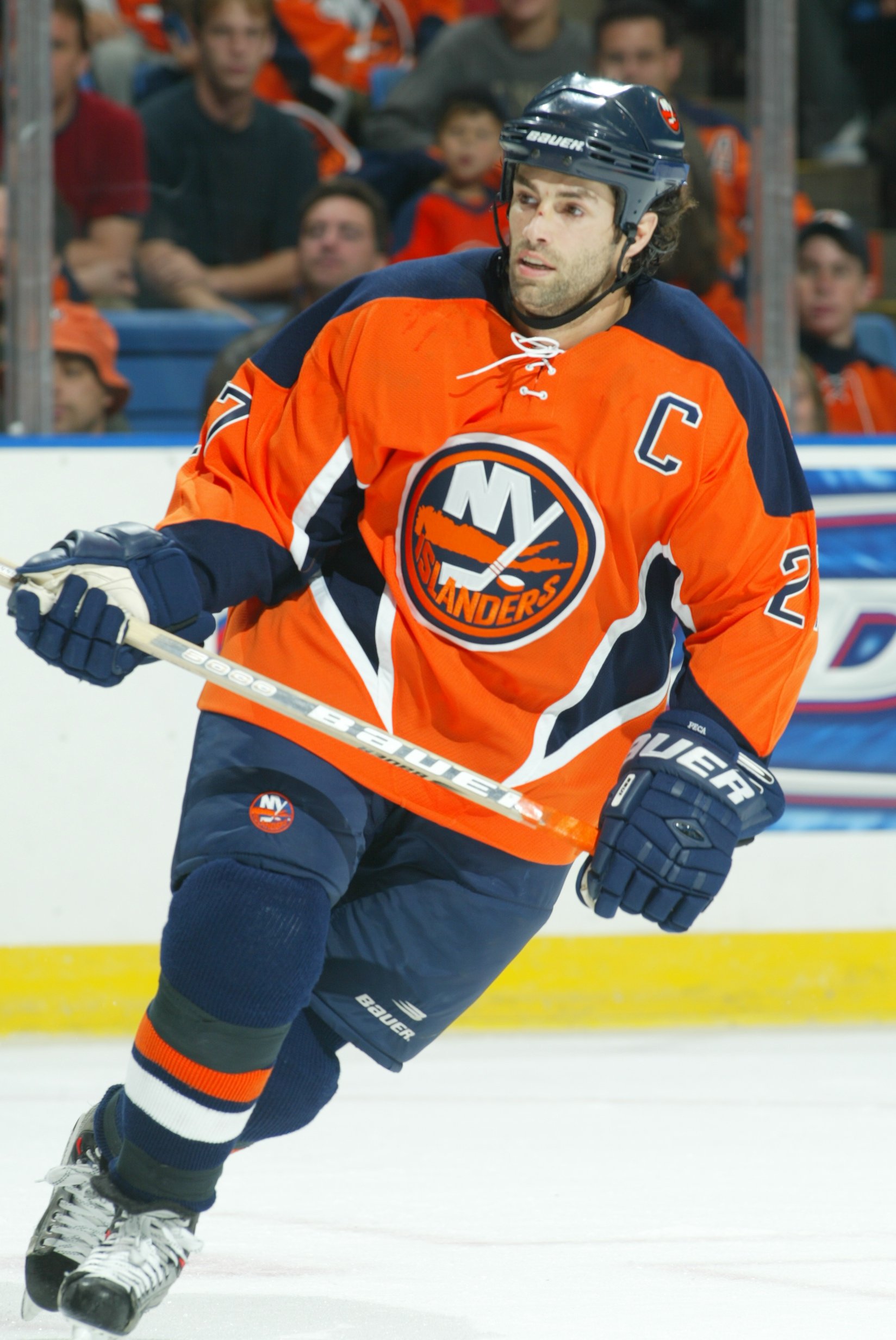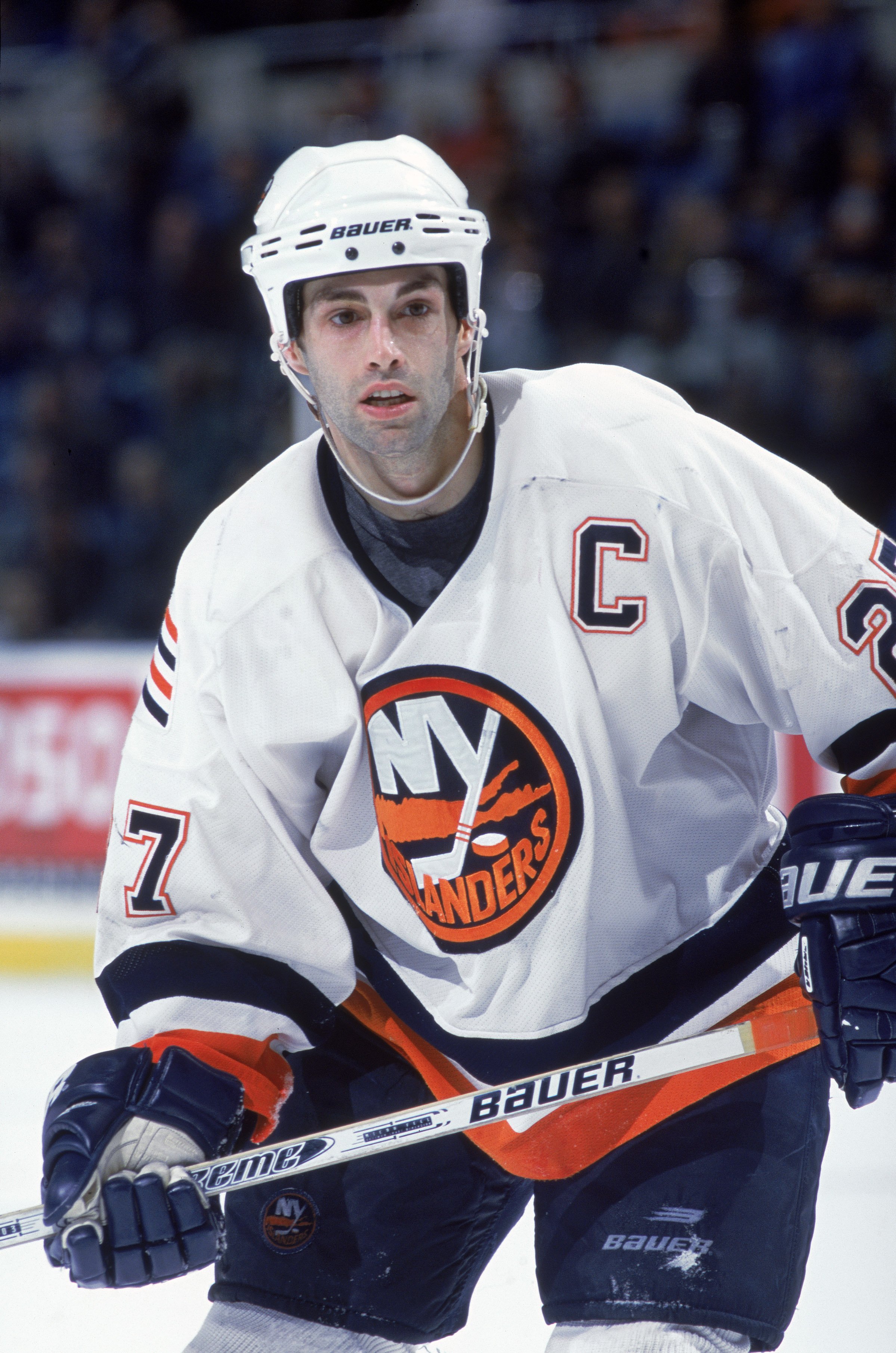Michael Peca
By zach weinstock
Every team talks about "culture." Veteran teams say they want to maintain it. Developing teams say they want to build it. It's rarely suggested you can simply trade for it.
Yet it has always felt true that when the Islanders dealt for Michael Peca on June 24, 2001, they acquired more than just a player.
In that way, the final act of General Manager Mike Milbury's Summer 2001 Trading Trilogy was perhaps the most essential, even if his first two additions, Adrian Aucoin and Alexei Yashin, were equally titillating.
There was no doubt all three players met needs for an Isles team which had just finished last in the NHL. Aucoin would provide top-pairing defense. Yashin would provide first-line playmaking. Peca would provide, well, everything else.
"We've been lacking in the leadership department," Milbury admitted. But that issue disappeared when the 27-year-old former Buffalo Sabres captain entered the picture.
For Islander fans, it was love at first listen, as Peca eschewed your typical interview clichés and instead spoke earnestly about how it felt to be shipped to a last-place team.
He loved it.
The Isles' struggles in 2000-01 were not a burden, Peca explained, but an opportunity for him to come be part of something memorable. He relished the challenge.
That challenge was met, resoundingly, as the Islanders improved from 52 points in 2000-01 to 96 in 2001-02 – a historic turnaround.
Though Yashin also came with captaining experience, stitching the "C" on Peca's #27 jersey was an easy decision for the Islanders. He brought gravitas to the role, which was not wasted in the somber autumn of 2001. Peca was proud to spend much of that season in an NYPD cap, and Long Islanders appreciated seeing him wear it. His grizzled face, with its scars of earlier battles and a perpetual five o'clock shadow, exuded the type of strength and resolve New York wished to project to the rest of the country and the world in the wake of an unfathomable tragedy.
And it helped that the Islanders and their new captain were on a roll.
In fact, it's actually remarkable how much time and ink was devoted to Peca's intangibles, given the weighty nature of his tangibles.
A punster might even call Mike's all around game "im-Peca-ble."




In 2001-02, the man nicknamed "Captain Crunch" for his board-rattling hits was voted winner of the Selke Trophy – in a runaway - as the best defensive forward in the game. At even-strength he was matched nightly against the best the opposition had to offer, and led all Islanders forwards in plus-minus anyway, at plus-19. He scored 60 points, which in the height of the dead-puck era was a hefty heap, and won 52.4 percent of faceoffs to lead the team. Add all that up, and it's difficult to imagine how a player can bring more value to the ice.
Plus his goals were usually clutch. Six came shorthanded. Five were game-winners. Two were in overtime. One came with under two seconds to play in regulation. His single strike in the postseason – a cool, calm breakaway - was a momentum-swinging barn-rocker.
"He was a special player," recalls then Islanders Head Coach Peter Laviolette," in the sense that he did everything. He wasn't the biggest guy on the ice, yet he hit like he was the biggest guy. He was an incredibly strong defensive player with really good offensive instincts and hockey sense, so you're talking about probably one of the most well-rounded players that I've coached."
It wasn't just his own coaching staff who understood Peca's importance. In the 2002 playoffs, Pat Quinn and the Toronto Maple Leafs paid Peca the highest compliment that can be given to an opposing player, which is to have that player followed every waking moment of a series. Out of all the talented performers on the Islanders, it was Peca on whom Toronto chose to stick the cunning and cantankerous Darcy Tucker, who chased Peca everywhere he went. But all Tucker got in return was trademark "Peca Cool." Every growl, snarl and slash was met with a sly smirk, a roll of the eyes, or a witty comment to the press. There was no doubt who was getting the best of whom, until Captain Crunch went down with a blown knee in Game Five. In one crashing moment, Peca's run of supremacy was over.
Peca unfortunately went down with a blown knee in Game Five after a hit by Tucker. In one crashing moment, "Captain Crunch" had a blown knee. His run of supremacy was over.
Though he'd never be quite the same, Peca was valiant in his comeback. The roar reverberating through Nassau Coliseum when he finally returned to the lineup the next November was nearly loud enough to be heard back in Toronto. Sure enough, by the 2003-04 season, Peca was back to playing an indispensable two-way role for the Islanders. The severe knee injury had taken some of his physical ability, but none of his heart, which came as a surprise to precisely no one.
After all, when the Islanders dealt for Michael Peca on June 24, 2001, they acquired more than just a player.

